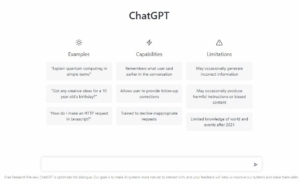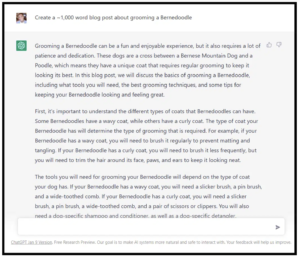Mackerel Media’s Monthly SEO Roundup – January 2023
Hello friends – and a very warm welcome to our first monthly SEO roundup of 2023.
Only 4 weeks into the new year, we’ve been spoiled for choice on news, updates and product launches that are seriously changing the industry as we know it.
From the future of AI to Google updates and growing competition in Search, here are the top stories that have got us talking this month:
All eyes on ChatGPT
We couldn’t kick off a January 23 roundup without mentioning the AI tool on everyone’s lips (and desktops). The AI-powered chatbot, ChatGPT, has dominated headlines with its ability to generate human-like responses to a whole range of questions and prompts, from maths equations to conversation starters – it can even pass an MBA exam.
Source: ChatGPT
Surpassing 1 million users in just 5 days, it’s fair to say that the tool has captured people’s attention. And for good reason. A program this powerful (albeit with its self-proclaimed limitations), raises a whole variety of concerns around the impact of AI on our work, society, education, not to mention our general way of living.
So, what impact does ChatGPT have on SEO? There are a few different strands to this – each worthy of its own blog – but the central focus lies on content generation.
The debate around AI-generated content creation in SEO has been around for some time. While the ability to churn out high quality content in minutes would save brands and marketing teams a whole lot of time and money, the emphasis here is on ‘high quality’, which is where AI tools just haven’t been quite hitting the mark. There’s also the small hurdle of AI content being viewed as ‘spam’ by Google’s own webmaster guidelines… preventing these tools from hitting the mainstream.
But does ChatGPT represent a step forward? Maybe. While the content produced still displays some of the telltale signs of AI generated content, it’s certainly a step up from existing content writing tools out there.
Source: Search Engine Land
We can see from this example: the detail, grammar, syntax is there. It does feel a little too structured, formulaic, repetitive in parts, but it’s not terrible.
Putting style and form to one side, we also have the issue of credibility. One of the most significant drawbacks of ChatGPT is its propensity to generate incorrect information, and present it in a highly plausible and convincing way – not great for boosting trust in online audiences and limiting the spread of misinformation (just ask CNET).
Ultimately, there is still some way to go before ChatGPT is writing content for search, but can the tool support SEOs in other areas? Search Engine Land has tested out its ability to support keyword organisation, link building and code generation, with generally positive outcomes. Overall, the tool showed itself to be a great asset to get the cogs turning, but without being trained as an SEO tool first and foremost, ChatGPT is unlikely to take over from the likes of Ahrefs and SEMRush in the near future.
The bottom line? While ChatGPT represents huge strides forward for AI (and is a fun tool to mess around with in the name of ‘research’), we don’t see it becoming the new sidekick of SEO teams anytime soon. A case for the future of AI-generated content though? Let’s put a pin in that one.
Google experiments with Continuous Scroll
Google is changing what it means to rank on page one with the introduction of continuous scroll. Moving away from viewing search results as ‘web pages’ – as if appearing on paper – the new feature is designed to create a more seamless experience for users, more akin to the ‘infinite scroll’ models adopted by popular social media platforms.
Starting today, we’re bringing continuous scrolling to desktop in English in the U.S. so you can continue to see more search results easily. When you reach the bottom of a search results page, you'll now be able to see up to six pages of results. pic.twitter.com/xIuVP24FFm
— Google (@Google) December 5, 2022
As an opportunity to maximise Google’s existing SERP features, such as People Also Ask, Shopping Ads, Image Search and Related Searches, the new design is hoped to create more interaction within the SERPs, with more scope for inspiration and discoverability as users browse results.
So what will this mean for organic SEO efforts? Well, it goes without saying that ranking page one won’t carry the weight it once did… but it is likely that the feature will encourage more results to be viewed, increasing the chances of your page being clicked even if you aren’t quite hitting the top spot.
We’ll know more about the true impact of this feature when it is rolled out more widely, but for now, brands can help enhance their visibility in this new format by:
- Focusing on content which is already ranking (we’re talking pages 2-5) and optimising for key search terms to enhance discoverability
- Getting creative with headings to help content stand out from a larger crowd
- Play into the new format by targeting ‘featured snippets’ and People Also Ask
Competition in the ads space gets hotter
In our November roundup, we covered increasing competition in search with the launch of Shopify’s universal search feature. This month, temperatures continue to rise as Microsoft invests significantly into its Ad Business, doubling the size to $20 billion.
While the ads space has been dominated by Google and Meta for close to a decade, the industry is changing. The combined market share of these ad giants fell below 50% for the first time since 2014, leaving more room for newer players to grab a slice of the pie. TikTok, Amazon and Instacart are frontrunners, and Elon Musk is on a mission to ensure Twitter isn’t far behind.
So, what’s the case for Microsoft Ads? It’s true that Bing holds a minute market share compared to its competition, but it is growing significantly year on year, along with annual revenues. Owing to smaller audiences, the platform is also cheaper than Google Ads, offering more audience targeting capabilities at a lower cost per click.
Honestly, we’re not sold on this one just yet, but we will be keeping a close eye. The recent $10 million investment will bring a slew of new features, including better data visualisation, extended shopping campaigns and even a brand new retail marketplace, all of which we look forward to checking out for ourselves.
Microsoft’s performance aside, we’re glad to see more competition in this space. It encourages greater innovation, increased investment in better features. And, if it results in more competitive pricing from the likes of Google and Meta – well, that’s a welcome bonus.







